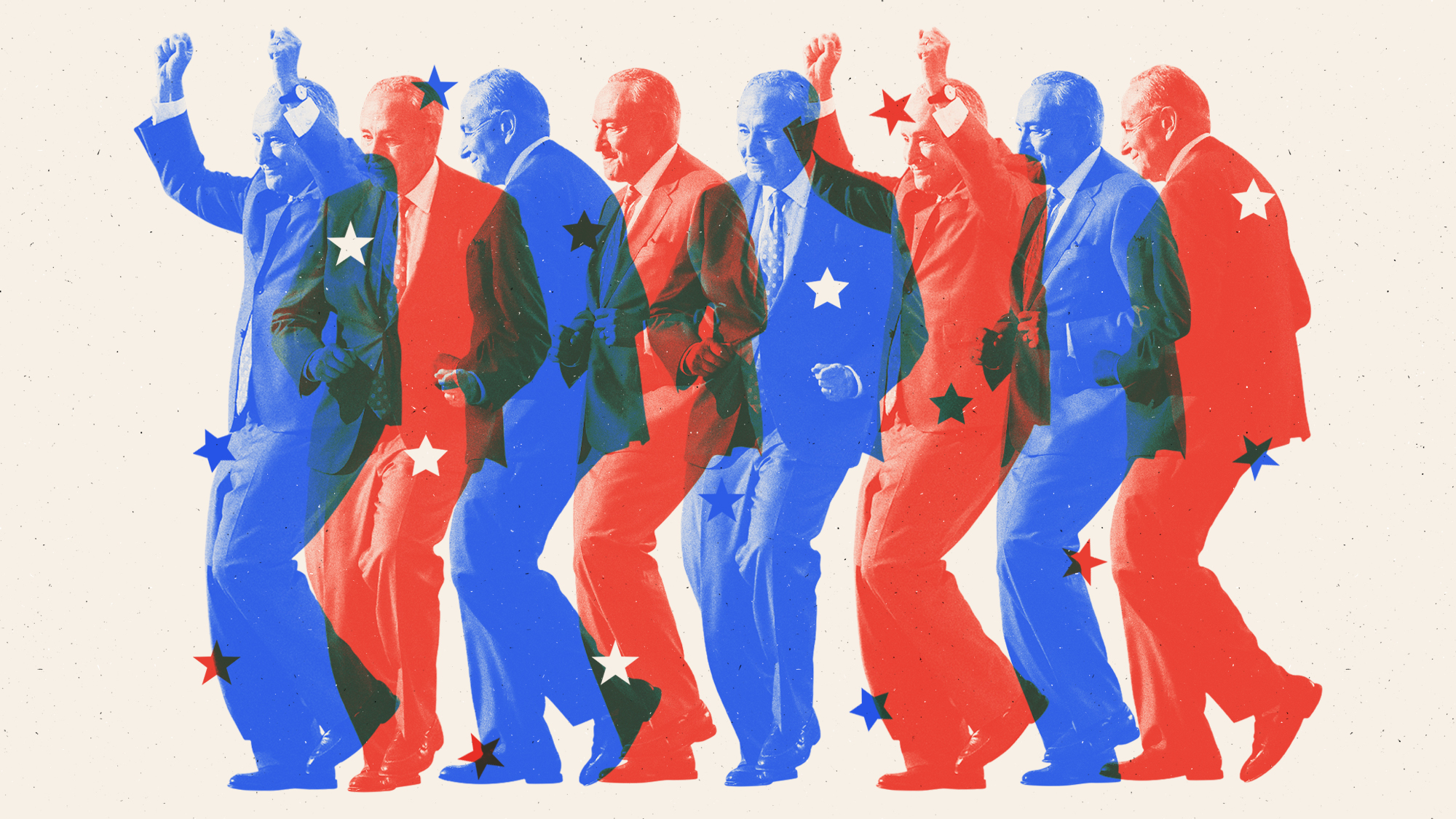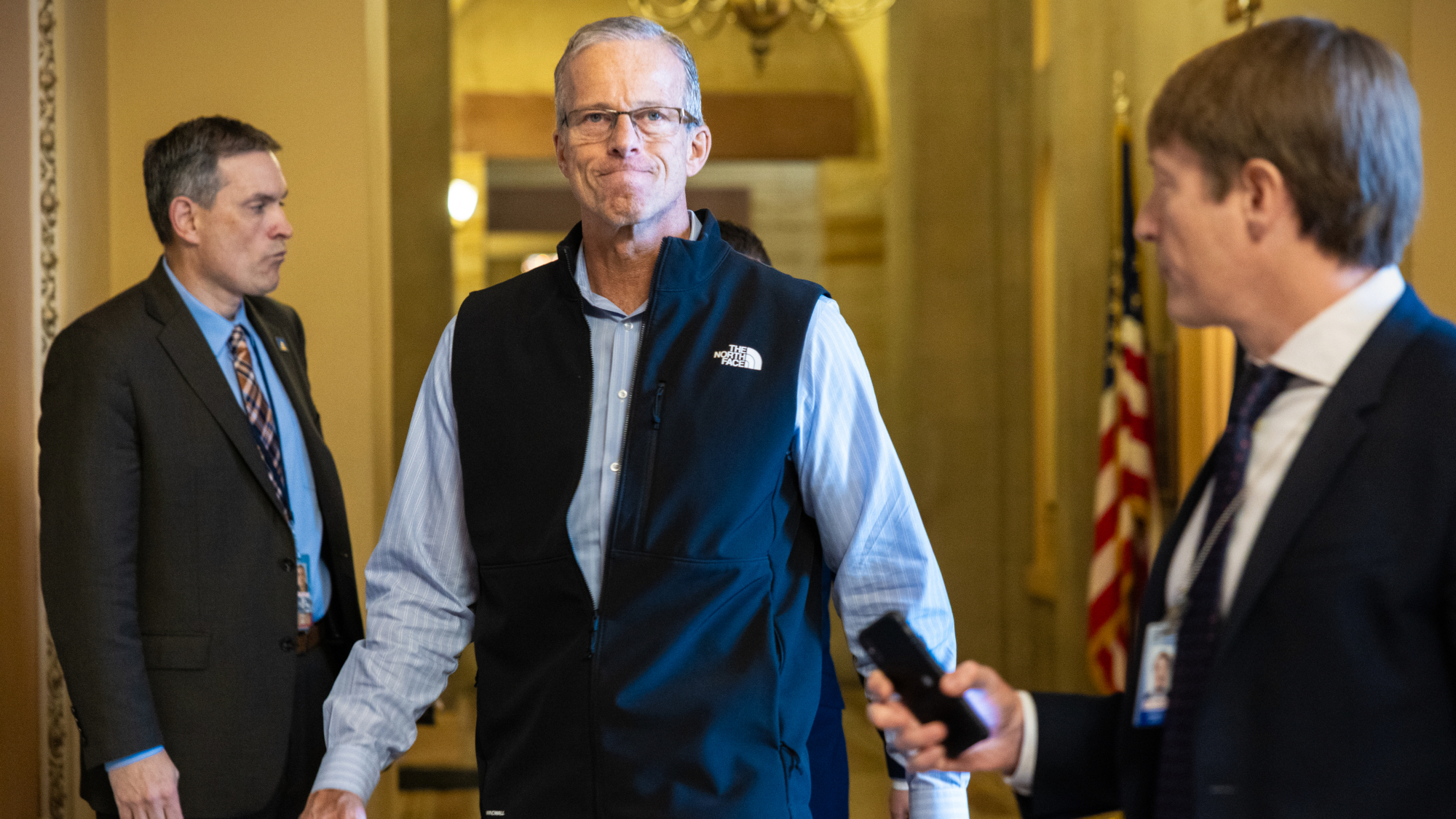Republicans are botching the coronavirus stimulus
But Democrats aren't doing much better


A free daily email with the biggest news stories of the day – and the best features from TheWeek.com
You are now subscribed
Your newsletter sign-up was successful
The coronavirus pandemic is dissolving the American economy. Goldman Sachs analysts predict that this week well over 2 million people will file for unemployment benefits — something like 3-4 times as many as during the nadir of the Great Recession in 2008-9.
Congress is debating various economic rescue packages. Senate Republicans have come up with an insufficient and ethically monstrous plan that would deliberately leave out the poorest Americans. Senate Democrats have a better plan, but it's still not good enough, and so far Speaker of the House Nancy Pelosi has not even come out in support of that.
Unless the Democratic Party gets its act in gear and unites around a better proposal, the Republican approach stands a good chance of being enacted — and could help Trump win reelection.
The Week
Escape your echo chamber. Get the facts behind the news, plus analysis from multiple perspectives.

Sign up for The Week's Free Newsletters
From our morning news briefing to a weekly Good News Newsletter, get the best of The Week delivered directly to your inbox.
From our morning news briefing to a weekly Good News Newsletter, get the best of The Week delivered directly to your inbox.
There are several huge problems with the Republican plan. The first is that it deliberately leaves many people out. They would cut a base check of $1,200 to individuals, or $2,400 to married couples who file their taxes jointly. But this amount would both phase in and out depending on prior income — you need at least $50,000 in previous earnings to qualify for the full amount, and it would phase out at incomes above $75,000 (or $150,000 for couples). People with little tax liability would get only $600, and the roughly 30-40 million people who are part of households that don't file taxes at all — largely the poorest people who need help the most — would get nothing.
The second is that these complicated eligibility schedules would be calculated based on 2018 income — that is, before the crisis hit. Millions of upper-middle class people who have lost their jobs and have no work income will not get the help they need. Third, all these eligibility requirements are going to be a huge pain in the neck that delays implementation for weeks at least. Income support should both be much bigger and universal, so as to get money into people's hands as quickly as possible. As Bernie Sanders suggests, payments of $2,000 per person per month for as long as the crisis lasts is a good start — and the IRS can be instructed to add a tax on top earners later if we are concerned about fairness.
Finally, cutting direct checks to individuals is arguably not the most important thing to be done. State unemployment insurance systems are funded in part by the federal government, and in part through state employer taxes and trust funds. The coronavirus recession is already slamming these programs by drastically increasing benefit payouts and reducing revenue — and many states, including California, have only a small trust fund buffer. The federal government should immediately take full responsibility for funding these systems, and upgrade the benefits to cover 100 percent of previous wages, perhaps up to a cap of $75,000 per year, again as Sanders suggests. The Senate Republicans' proposal does nothing to address this looming catastrophe.
Meanwhile, we very badly need a business rescue as well. Businesses, especially small ones like independent restaurants, coffee shops, mechanics, and so on will be ruined by the millions in a matter of weeks if they aren't saved. The various Republican proposals are not even close to what is needed here, especially for small businesses. Trump's own stimulus plan has only $150 billion for business, and gives far too much focus to relatively small sectors like airlines and hotels (it surely is not a coincidence that Trump owns many of these).
A free daily email with the biggest news stories of the day – and the best features from TheWeek.com
The state should act as a "payer of last resort" to keep businesses solvent, and require them to maintain their current employment while not paying bailout monies to shareholders or executives (and also in return for shares in publicly-traded firms) — as, once again, Sanders suggests. That would limit unemployment and allow America "to start our economy up again without the risk of losing the stores and restaurants integral to our communities," he writes.
Senate Democrats seem to be slowly coalescing around a plan that is somewhat closer to Sanders' vision, but is still not as generous, and still means-tested on the top end. But Speaker of the House Nancy Pelosi, who unlike Senate Democrats has veto power over any coronavirus response, has all but vanished. She recently released a joint statement with Senate Minority Leader Chuck Schumer (D-N.Y.) vaguely setting forth some decent principles, but was non-committal on whether she supports the Senate plan or anything else.
Joe Biden, the presumptive Democratic presidential nominee, is nowhere to be seen. His last public appearance was a livestreamed speech in which he vacantly stared into the camera at the end, and seemingly had to be reminded of what was happening by his wife. Biden's Twitter account is proposing such ludicrously weak stuff as asking corporations politely to stop share buybacks in the coming year. While buybacks are indeed terrible (and should be banned for any companies that get rescued), they are basically a non-issue at the moment. Virtually no company in a gigantic recession is going to be buying back its shares, and even if they were, they aren't going to listen to mere suggestions.
It is criminally irresponsible for the top Democratic leadership, above all Pelosi, to be AWOL at a time like this. Trump's approval rating on the coronavirus response appears to be increasing in some polls, driven in part by increasing Democratic voter approval (though others have him slightly underwater). He's the only national figure giving daily press conferences where he at least seems like he is doing something.
While it's still early in the crisis, a lack of consistent Democratic messaging from the top on how Trump botched the crisis, and why Republican plans are grossly insufficient, runs the risk of his being able to portray the crisis as an unavoidable calamity as George W. Bush did with 9/11. Trump then might be able to sell his party's lousy plans as the best that could be done, winning reelection on a rally-around-the-flag effect, while causing millions of Americans avoidable suffering during the crisis, and potentially inflicting severe long-term damage on the economy. If Democrats want to avoid this, they are going to have to figure out some better plans and get in front of some cameras.
Want more essential commentary and analysis like this delivered straight to your inbox? Sign up for The Week's "Today's best articles" newsletter here.
Ryan Cooper is a national correspondent at TheWeek.com. His work has appeared in the Washington Monthly, The New Republic, and the Washington Post.
-
 Antonia Romeo and Whitehall’s women problem
Antonia Romeo and Whitehall’s women problemThe Explainer Before her appointment as cabinet secretary, commentators said hostile briefings and vetting concerns were evidence of ‘sexist, misogynistic culture’ in No. 10
-
 Local elections 2026: where are they and who is expected to win?
Local elections 2026: where are they and who is expected to win?The Explainer Labour is braced for heavy losses and U-turn on postponing some council elections hasn’t helped the party’s prospects
-
 6 of the world’s most accessible destinations
6 of the world’s most accessible destinationsThe Week Recommends Experience all of Berlin, Singapore and Sydney
-
 Trump links funding to name on Penn Station
Trump links funding to name on Penn StationSpeed Read Trump “can restart the funding with a snap of his fingers,” a Schumer insider said
-
 How realistic is the Democratic plan to retake the Senate this year?
How realistic is the Democratic plan to retake the Senate this year?TODAY’S BIG QUESTION Schumer is growing bullish on his party’s odds in November — is it typical partisan optimism, or something more?
-
 The billionaires’ wealth tax: a catastrophe for California?
The billionaires’ wealth tax: a catastrophe for California?Talking Point Peter Thiel and Larry Page preparing to change state residency
-
 Bari Weiss’ ‘60 Minutes’ scandal is about more than one report
Bari Weiss’ ‘60 Minutes’ scandal is about more than one reportIN THE SPOTLIGHT By blocking an approved segment on a controversial prison holding US deportees in El Salvador, the editor-in-chief of CBS News has become the main story
-
 Will Chuck Schumer keep his job?
Will Chuck Schumer keep his job?Today's Big Question Democrats are discontented and pointing a finger at the Senate leader
-
 Senate takes first step to end record shutdown
Senate takes first step to end record shutdownSpeed Read Eight senators in the Democratic caucus voted with Republicans to advance legislation to reopen the government
-
 Has Zohran Mamdani shown the Democrats how to win again?
Has Zohran Mamdani shown the Democrats how to win again?Today’s Big Question New York City mayoral election touted as victory for left-wing populists but moderate centrist wins elsewhere present more complex path for Democratic Party
-
 Judge halts firings during government shutdown
Judge halts firings during government shutdownFeature A federal judge blocked President Trump’s plan to cut jobs tied to “Democrat programs,” ruling that his administration violated layoff laws during the shutdown
